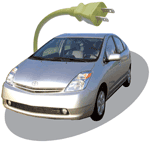Plug-In Partners and AutoNation Join Forces to Support Manufacture of Plug-in Hybrid Vehicles
 |
SEE ALSO: PHEV Information
AUSTIN, Texas, Oct. 11, 2006 -- AutoNation, Inc. , America's largest automotive retailer, has joined the Plug-In Partners campaign calling on automakers to manufacture plug-in hybrid electric vehicles.
"The development of plug-in hybrids could reduce America's addiction to oil," said AutoNation CEO Mike Jackson. "These new hybrids would offer consumers a 50-mile all-electric range, get the equivalent of 100 miles per gallon, be fully recharged at night and deliver all the performance and comfort of traditional gasoline-powered vehicles without the damaging emissions. We believe Americans will buy these vehicles, which is why we want to sell them."
The Plug-In Partners campaign, launched in January 2006 by the City of Austin and Austin Energy, has attracted nearly 60 cities and counties, including Los Angeles, Dallas, Boston, Philadelphia, Chicago, San Francisco, Baltimore and Phoenix, as well as dozens of environmental, national security organizations, business and utility partners. The coalition is working with its partners to generate "soft" fleet orders to demonstrate the potential market for plug-in hybrid vehicles. It also has begun a nationwide petition drive for individual consumers to express their support and interest in buying a plug-in hybrid vehicle.
Austin Mayor Will Wynn said: "AutoNation's support of the Plug-In Partners campaign demonstrates the growing momentum for the manufacturing of plug-in hybrids. Mike Jackson certainly knows what type of vehicles that Americans will buy. We salute his commitment to help us reduce this country's dependence on foreign oil and decrease greenhouse gas emission while also lowering fuel costs for consumers."
Contrasting plug-in hybrids to the limited range of earlier electric vehicles, Jackson added, "Next-generation batteries are significantly more powerful and can tolerate discharging and charging much more forgivingly than earlier versions. That opens up the possibility of creating a vehicle that will deliver genuine benefits to consumers and society."
Plug-In Hybrids Information
Gas: Optional
Plug-In Hybrid Electric Vehicles (PHEVs) are outfitted with a battery pack sufficient to power the vehicle from 20 to 60 miles on battery charge alone. Considering that half the cars on America’s roads are driven 25 miles a day or less, a plug-in with a 25-mile range battery could eliminate gasoline use in the daily commute of millions of Americans. The cost of an equivalent electric gallon of gas is estimated to be less than $1.00.
PHEV technology is already available and functioning. DaimlerChrysler is producing a Sprinter Van prototype with an all-electric range of 20 miles. Also on the road are existing standard hybrids that have been converted to plug-ins.
The Difference Between Standard Hybrids and Plug-in Hybrids
Basically, PHEVs use the same technology as the popular hybrids on the road today, but have a larger battery that can be recharged by plugging into a standard home outlet.
Key PHEV Attributes:
Gets about twice the fuel economy of a conventional vehicle and 30-50% better fuel economy than a standard hybrid Plugs into a standard (120-volt) home electrical outlet to receive charge Depending on design and battery size can be driven 20 to 60 miles without the use of gasoline Flexible Fuel PHEVs
PHEV technology can also be combined with existing flexible fuel technology to increase fuel efficiency even further as well as further reduce greenhouse gases and imported oil.
Technical Details
Both standard hybrids and PHEVs are powered by a combination of electricity and liquid fuels; however, PHEVs draw their charge not only from the engine and captured braking energy but from the electrical grid as well when they are plugged into a standard electrical socket. PHEVs have liquid fuel tanks and internal combustion engines, so they do not face the range limitation posed by electric-only cars.
Want to know more about PHEVs? Visit our Resources section. Or, see "All About Plug-in Hybrids" at CalCars.org, a California-based initiative working to promote the adoption of these efficient, non-polluting autos.


